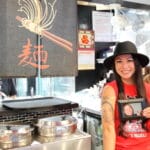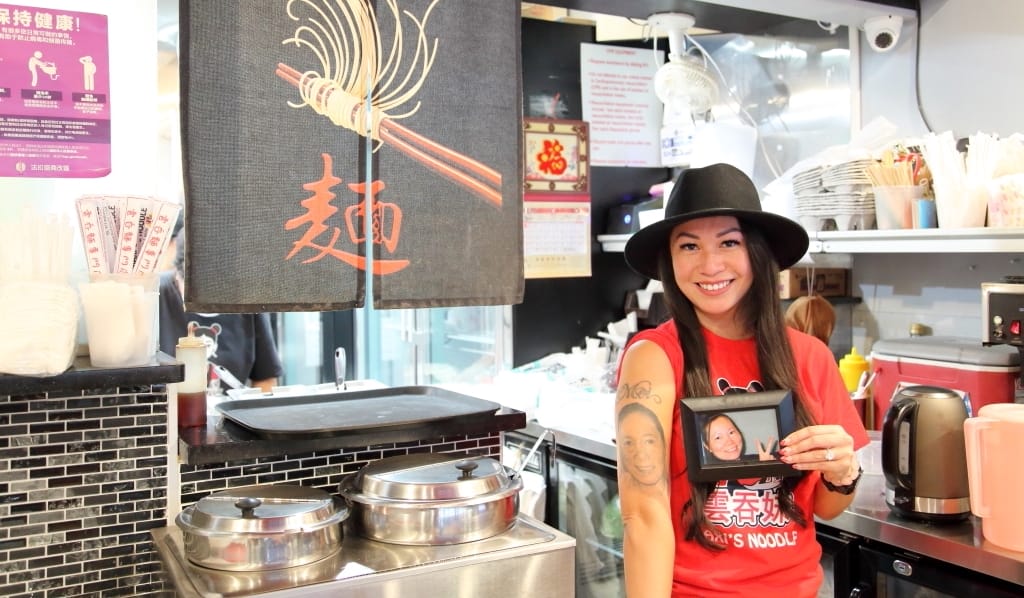During a busy evening on Main Street in Flushing, the sight of a food cart grilling skewers of meat doesn’t seem out of the ordinary on a thoroughfare filled with street vendors.
After hanging around long enough, though, it becomes clear that this cart is different from similar ones up the block. The most obvious difference is its operator, Ekrem, a young man from western China’s Xinjiang region who shows an intense care for each and every skewer of his Uyghur-style barbecue.
As he effortlessly and gracefully flicks the perfect amount of his secret spice blend on each bit of meat (all of which are quality cuts), he tells us that nothing in them is artificial, gesturing up the street to indicate that the others in the area do not have the same exacting standards. Plumes of smoke created by the dripping fat of barbecue on charcoal rise up into the dense summer air and serve as his calling card. The aroma of lamb is strongest among the many types of meat being rotated and spiced on his specially designed cart.

Another difference? Ekrem’s cart is parked in front of Nurlan, a brand new restaurant that is the only Uyghur spot in a neighborhood filled with Asian dining options. Since Nurlan’s opening in mid-May, Ekrem – who has been in the United States for four years and started his barbecue business almost immediately upon arrival – and his cart have become regular fixtures in front of the eatery, in essence becoming its outdoor annex (although the two started out as separate businesses, they are in the process of merging into one). Adil, co-owner of the restaurant, says he wanted to have the area’s only Uyghur barbecue cart operator here to complement the rest of the menu, which he says stands out amongst its competition in New York City.
The food of Xinjiang Uygur Autonomous Region has always lived on the city’s fringes; you could find sprinklings of this exciting cuisine here and there, most notably at Brighton Beach’s Kashkar Café. While he enjoys the food there, Adil says the “problem” is that it is seen through the lens of Russians, who add far too much yogurt to many dishes and prepare them in the style of Uzbek cuisine, which Russians are more familiar with.
Laghman is enjoyed throughout Central Asia, but that’s akin to saying that pasta is a favorite food in Italy.
This same thing occurs at Chinese-owned establishments: they replicate how the cuisine might be interpreted in Beijing and completely erase the identity of the Uyghurs from the dishes that originated in their kitchens. Although Nurlan was created with the neighborhood’s Chinese population in mind, Adil and the staff describe their offerings as “Central Asian-style Turkic Uyghur food.” Yogurt, it should be said, was only found in the form of a cold drink to be enjoyed after a meal, as is tradition.
Adil is the perfect mouthpiece for the restaurant not only because he can speak fluent English and Mandarin (not to mention German and Turkish), but because he also has a story that comes full circle to bring him back to the industry. As a boy in Toksun County, located southeast of Urumqi, Xinjiang’s capital city, his dad used to tell him the cautionary tale of a hungry ex-king – a reminder that he must have a set of skills to fall back on if his life ever put him into a tough situation. This warning led to work in the local cooperative, providing Adil with a foundational experience that he draws on as a restaurant owner today. Thankfully, though, he was never forced to fall back on anything – before opening Nurlan, Adil studied in Beijing and then eventually Turkey and Germany before landing a series of prosperous jobs in the science industry there and in Dubai.
Most of the team at Nurlan calls the same area around Toksun home, although they only found each other here in New York City. The camaraderie between them is already clear in their interactions and when viewing the dishes that come from the kitchen.

Laghman is enjoyed throughout Central Asia, but that’s akin to saying that pasta is a favorite food in Italy – the hand-pulled noodles can be found in many different forms depending on location and preference. The namesake Nurlan laghman is served in typical Uyghur-style, like a plate of spaghetti rather than in soup like its Uzbek and Dungan brethren. This version features wood-ear mushrooms and a slightly spicy and tasty tomato sauce.
Even more exciting, not least because it’s making its New York City debut, is ding-ding laghman, which features handmade noodles cut into small pieces that resemble corn kernels at first glance. These are a pleasure to eat, but require putting the chopsticks down in favor of a spoon to scoop up equal portions of them with meat and peppers. Both laghman dishes require extra work to be put in from Nurlan’s Uyghur bread to make sure each and every delicious oily drop is sopped up from the plates.
As luck would have it, their bread order was delivered for the day while we were chatting with Adil. The bread is baked according to their specifications by a Brooklyn-based Uzbek tandir. A young Uyghur customer who had apparently been waiting for the delivery to take a few loaves home tells us that he has been coming to Nurlan all the time since they opened.
Raising his loaves of bread and gesturing towards the kitchen, he exclaims: “This has been the best thing for me.”
Editor’s note: In light of the growing number of Uyghurs in the U.S. who have had family members detained by authorities in northwest China, we used first names only for this article.
 November 25, 2022 Maxi’s Noodle: Just Like Mom’s
November 25, 2022 Maxi’s Noodle: Just Like Mom’s
We're always glad for a second bite at a wonton. At Maxi's Noodle, in Flushing, this […] Posted in Queens September 16, 2020 Makana
September 16, 2020 Makana
The bright spots of dandelion yellow and sleek tabletops at Makana in Istanbul’s […] Posted in Istanbul September 23, 2019 Chaikhana Sem Sorok
September 23, 2019 Chaikhana Sem Sorok
Chaikhana Sem Sorok, a newly opened little café just off the Central Asian thoroughfare […] Posted in Queens
Jared CoheeJared Cohee
Published on September 11, 2019
Related stories
November 25, 2022
QueensWe're always glad for a second bite at a wonton. At Maxi's Noodle, in Flushing, this Hong Kong delicacy is notably larger than its Chinese forebears. The dumplings and fish balls at Maxi’s are hefty, too, each large enough to require two delicious bites, if not three. The size wouldn't matter, however, if the wontons…
September 16, 2020
IstanbulThe bright spots of dandelion yellow and sleek tabletops at Makana in Istanbul’s Beşiktaş district are a far cry from the cozy interiors of the Uighur restaurants dotting the multicultural streets of Zeytinburnu and Çapa. But after one bite of Makana’s dry-fried lagman, we know: Uighur cuisine has arrived in Beşiktaş. The neighborhood needs it.…
Learn all about the Bukharan community on our Queens trip!
September 23, 2019
QueensChaikhana Sem Sorok, a newly opened little café just off the Central Asian thoroughfare of 63rd Drive in Rego Park, proves more than anywhere else that all cuisines are fusion cuisines, if you go back far enough. Every day but Saturday – the Sabbath – loaves of round, crusty bread called non or lepyoshka emerge…



















































































